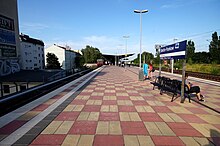Special train to Pankow


Sonderzug nach Pankow is a song by the German rock singer Udo Lindenberg that was released as a single in 1983 and is based on the melody of the 1941 American classic Chattanooga Choo Choo .
History of origin
In a radio interview with the SFB on March 5, 1979, Udo Lindenberg expressed the wish to give a concert for his fans in East Berlin . The interview was recorded in the original sound in the GDR and presented a day later as information to the State Committee for Broadcasting , Monitor Department, the chief ideologist and cultural officer of the SED, Kurt Hager . On March 9, 1979, he wrote by hand on the information: “Appearance in the GDR is out of the question”.
Lindenberg was annoyed by this rejection, because he did not succeed in implementing his plan for several years. Then at the beginning of 1983 he had the idea of writing a German text with the melody of Glenn Miller's swing classic Chattanooga Choo Choo in response to this rejection ; the original was written by Harry Warren (music) and Mack Gordon (text) and recorded on May 7, 1941. The German text of the 3:14 minute song is ironically directed at Erich Honecker, then Chairman of the State Council . He is portrayed as an ossified and hypocritical man who officially presents the ideology of the government, but is inside a rocker and secretly listens to West radio.
The reference to the Berlin district of Pankow in the title is based on the fact that the Schönhausen Palace located there was the seat of the President from 1949 to 1960 and then the State Council of the GDR until 1964 , and the representatives of the GDR government in the adjacent Mayakowskiring , before the move to Wandlitz , had their residence. "Pankow" was popularly used in the early days of the Cold War as a synonym for "the seat of government of the Soviet-occupied zone".
At the end of the song, a (station) announcement can be heard in Russian . The original text is: " Товарищ Эрих, между прочим, Верховный Совет не имеет ничего против гастролей господиен Гердина Линдина! "( " Towarischtsch Erich, meschdu protschim, Werchowny Soviet ne imejet nitschewo protiw gastrolej gospodina Lindenberga w GDR! " ), In German:" Comrade Erich, by the way, the Supreme Soviet has nothing against a guest performance by Mr. Lindenberg in the GDR! " Passage should point out that essential decisions of the GDR were made in the Soviet Union anyway .
Publication and Success
On February 2, 1983 Lindenberg's self-produced single Sonderzug nach Pankow / Sternentaler (Polydor # 810 076-7) was released in the Federal Republic of Germany and entered the charts there on February 7, 1983 , where it reached number 5 and there for four Weeks stayed. It was Lindenberg's best hit parade listing to date. It stayed in the charts for a total of 21 weeks, including seven weeks in the top 10.
In a letter accompanying the song, Lindenberg wrote to Honecker on February 16, 1983: “Let a real German plain-text rocker rock in the GDR. Show yourself from your relaxed, human and flexible side, show us your humor and your sovereignty and let the nightingale by Billerbeck raise her magic voice. Don't look at it all so tightly and tightly, Comrade Honey, and give your OK for my GDR tour ”.
Political Consequences

The disrespectful lyrics had raised the SED General Secretary Honecker. In a letter in August 1983, Lindenberg consultant Michael Gaißmayer tried to smooth things over. FDJ boss Egon Krenz then invited Lindenberg to play four of his songs as part of an FDJ peace concert with artists from all over the world in the Palace of the Republic in East Berlin.
On October 25, 1983 Udo Lindenberg's first and only appearance in the GDR until the fall of the Berlin Wall . This took place as part of the Rock for Peace festival in front of 4200 listeners in the Palace of the Republic, but at the request of the GDR leadership, Lindenberg did not sing this title. A tour through the GDR planned by Lindenberg for the following year did not take place; the tour was finally canceled in February 1984.
Lindenberg's line in the song that Honecker secretly likes to wear a leather jacket was implemented in 1987. That year he sent Honecker a leather jacket, which was answered by Honecker with a letter of thanks in which he described rock music as compatible with the ideals of the GDR. Furthermore, Honecker wrote that he would pass the leather jacket on to the Central Council of the FDJ so that they could send it to a rock fan. The letter also included a shawm as a present for Lindenberg. Honecker had played this instrument during his youth. When Honecker was on a state visit to Wuppertal on September 9, 1987 , Lindenberg gave him an electric guitar with the label “Guitars instead of creaking”.
Individual evidence
- ↑ Federal Archives with the original note ( Memento of the original of July 11, 2016 in the Internet Archive ) Info: The archive link was inserted automatically and has not yet been checked. Please check the original and archive link according to the instructions and then remove this notice.
- ↑ a b Ingo Grabowsky / Martin Lücke: The 100 hits of the century , 2008, p. 63 f.
- ↑ special train to Pankow in the song lexicon
- ↑ * The 'town' where the old cadres lived , by Jens Sethmann, Berlin tenants' association February 28, 2009
- ↑ Erich Honecker's letter of thanks to Udo Lindenberg at Zeit Online
- ↑ Article at sound bag